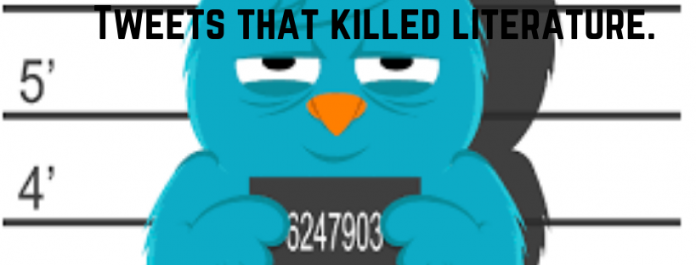After reading this, I am hoping that you agree with me that man, having gone insane, regains control of his mind by writing.
So, what happens when people stop writing? Or when books become less central to society? What happens when our writers and thinkers express themselves through Facebook and Twitter instead of on the page?
Clearly, tweeting at, instead of writing to, presidents, philosophers, friends, and enemies, can only go from terribly bewildering to completely nuts. No one is getting saner in the Twitter storms that sweep the landscape daily.
In reality, social media is not literature, and tweeting is not writing. The text, the tweet, the post – these hasty bits of content do not give access to the deep well of the hidden mind. They can’t make you better, but they can make you worse.
I say this from a conviction that society, having gone insane – caught in a fever, lost in war, entangled in corruption, deceived by political promise – regains control of its narrative by creating literature. Novels, histories, poems.
It’s through writing and reading that a person or people can access the quiet part of their brain, the voice amid the chaos that explains who one is and what one must do. A person who reads has a different kind of focus and attention, a different kind of mind. Same applies to society.
I wish we could have a name for this process of literary transformation. If it was the best thing to happen to society then we could call it the “higher autobiography,” not what actually happens but what it feels like and what it means, a lost moment reanimated.
Sadly, the reality is that all this lacks the energy of the novel – the fury of the gun, a society is driven insane not merely by political betrayal or the break-up of a system but by Twitter and Facebook and the way our writers and politicians use social media to battle ideas, a sense that everyone knows.
Avid readers would agree with me that the page, or novel also serves a therapeutic function. As anyone who’s spent serious time writing can tell you, the pen (or keyboard) connects to a different part of the mind, or a different mind, than the one that chatters at you endlessly through the day.
Once we all agree on this, we will then understand that it is that hidden mind that he sees as the way to carry society out of the bad time and into something different from our current disaster.
Often than not, you are bound to find our writers and thinkers hunched over a laptop or an iPhone, not writing books or novels but texts, emails, tweets, updates to their Facebook page, tagging friends and enemies, celebrities and the famous dead.
The solution is, as it has always been, literature – a quiet room in the back of the crazy house, a single light burning. But we can’t get to that room because we no longer have the time or patience to read those books. We’ve lost the habit. And the books we don’t read don’t get written.
By Tinashe Zvakasikwa.












